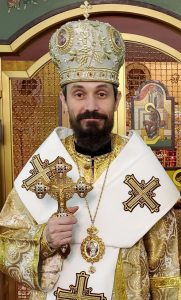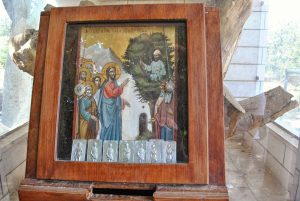Dear brothers and sisters,
God gives us the time of the Great Fast (Lent) so we can pause, quiet down, and turn ourselves toward Him. We are invited to grow in our spiritual life, to get closer to our Lord Jesus Christ, and to prepare ourselves well for the celebration of the feast of Pascha – Resurrection.
Missionaries are often asked: “Why did you have to leave for a mission to a foreign country, to a culture of which you are not part? Hadn’t you better stay home to proclaim the Gospel among your own, in your own language?” One answer is this: “People need to be told of what they do not see on themselves, and they need to be told by someone who is capable of seeing from the different perspective, from the outside, from a different culture.” That is why Christ sent his apostles throughout the world.
Our Church is called to be missionary. My intention is to proceed with opening new parishes in our Eparchy, since the goal of the missionary work of the Church is to create communities where the Eucharist can be celebrated. In so doing we are emulating the works of the apostles, especially the apostle Paul in the Acts of the Apostles. In his Encyclical Redemptoris Missio, Pope St. John Paul II tells us, “one of the central purposes of mission is to bring people together in hearing the Gospel, in fraternal communion, in prayer and in the Eucharist.” (¶ 26) I am pleased that the faithful in our parishes often receive the Holy Eucharist. On one hand, you are to be commended for such devotion and commitment.
On the other hand, we recognize that the Holy Eucharist is also a source of strength in our weakness. The Holy Eucharist helps us to be like the one who we follow – Jesus Christ. We will never be quite like him, but we can at least approach Him. Here, in the Eucharist, He offers forgiveness for venial sin and a cure for our shortcomings. Thus, we understand the words of the Holy Father Francis in his Exhortation Evangelii Gaudium, “the Eucharist, although it is the fulness of sacramental life, is not a prize for the perfect but a powerful medicine and nourishment for the weak.” (¶ 47) Of course, the Eucharist is not intended for the forgiveness of mortal sins, which are actually an obstacle blocking us from worthily receiving the Eucharist (this is why we also have the sacrament of Confession). You can check the list of those mortal sins on our website www.parma.org
Recall the story in the Book of Exodus. The Hebrews journeyed to freedom from the slavery of the Egyptians. First, they had to recognize that they were indeed slaves. If they did not recognize this fact, they would never understand the desire for freedom. On their passage to freedom God fed them with manna. This is exactly what the Eucharist is doing for us. It is nurturing us (slaves to sin) on our journey to freedom. But we should also remember that the initial enthusiasm of the Hebrews at receiving manna diminished. In fact, after, this awe-inspiring “bread from heaven,” became for them something rather ordinary. After losing proper perspective, they began to murmur and grumble about almost anything. They were even starting to feel sorry for the slavery they had left in Egypt. That was the reason why God ordered an altar built where they could bring sacrifice for reconciliation. Is there any among us who has the audacity to say that he is free from vices or bad habits? It would be a miracle. Who is untouched by temptations from power, money, prestige, praise, uncommitted relationships, TV, internet, smart devices, pornography, sex, alcohol, or sport?
This underscores the necessity of Confession. The confessional has distinct advantages:
- It’s the place where, after the thorough examination, I admit my failures and where I am begging God and people for forgiveness (both psychologically and spiritually)
- It’s the place where I can renew the spirit. My spirit was ignited at my baptism. Reconciliation is like a repetition of baptism. Not literally, but figuratively. Our resolutions have a tendency after a while to become lukewarm, and they need occasionally to get refreshed.
- Confession is help from above. It is not only the place where we receive forgiveness for our sins, but also a source of strength to resist temptation. This is part of the mystery of the sacrament. Sacrament is a visible sign of God’s invisible grace. I need God’s grace not only as a sinner, but even to give me the strength to avoid sin. Our lives are, after all, an effort to follow Jesus Christ. But what kind of following would it be without Christ helping us. He has chosen you, and He will surely give you everything you need so you can fulfill the call. God will never lead you where he cannot sustain you.
- Confession has a great psychological effect. Its ironic when people, instead of going to confession, would rather pay big money for all kinds of manmade therapies and counseling. At the same time, they look at Confession as some kind of goofy practice. Well-known psychotherapist Carl Jung said that, among the countless people he treated with therapy, he found nobody who would go to Confession. Priests are delighted to provide this service for free, by hearing your Confession. Not only is it free, but it comes with some measure of expertise and experience – consider the hundreds of Confessions each priest hears every year. Do not underestimate us priests. Many of us are well qualified and educated, and all have acquired a certain pastoral “wisdom” by hundreds of hours hearing the stories of people who are hurt or broken and in need of healing.
Maybe in our Eparchy we too need to rediscover the grace of Confession. Perhaps in your life this sacrament of healing has been long-forgotten. I sincerely and warmly recommend to all the faithful in this time of the Great Fast to go back to Confession and to get ready for Pascha. You can find some helpful material on our eparchial website www.parma.org
Brothers and sisters, I pray that we all discover the awesome power of the sacrament of Reconciliation as the authentic way of penance, and as a precious meeting with the loving and forgiving Christ.
+Milan
Bishop of the Eparchy of Parma


